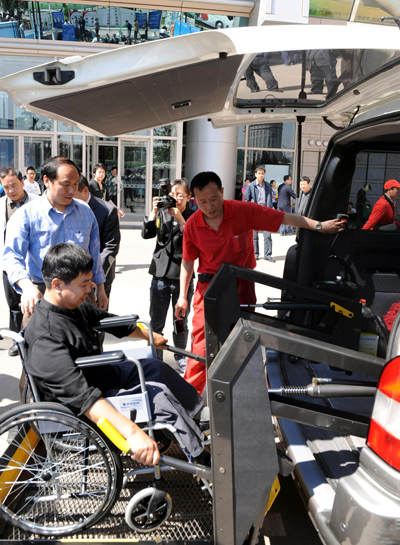|
 |
|
EXPERIENCING CONVENIENCE: A disabled person rolls his wheelchair directly into a service car in Dongcheng District in Beijing on May 13 (TANG ZHAOMING) |
In 2009 and 2010, procuratorial organs filed and investigated cases involving 1,002 government functionaries who had taken advantage of their positions and powers to conduct illegal detentions, take revenge, disrupt election and commit other crimes. Courts at all levels held hearings for 18,600 cases of illegal detention, including those committed by government functionaries who abused their positions and powers.
In February this year, the Standing Committee of the National People's Congress (NPC), China's top legislature, adopted the eighth Amendment to the Criminal Law.
The amendment abolished the death penalty for 13 types of economic and non-violent crimes, such as fraud. The reform reduces by one fifth the total number of crimes punishable by the death penalty.
It also listed progresses achieved in the past two years in guaranteeing people's rights to know, to participate, to be heard and to oversee.
On March 2010, the NPC passed a resolution on the revision of the Electoral Law, stipulating urban and rural deputies to people's congresses shall be elected in accordance with the corresponding population proportion, so as to ensure citizens' equal right to vote.
Rights of special groups
China has taken further measures to protect the rights and interests of ethnic minorities, women, children, elderly people and the disabled.
According to the SCIO report, China earmarked 2.779 billion yuan ($433.14 million) as a development fund for ethnic minority groups in 2009-10. In Tibet, 46,000 households of Tibetan farmers and herdsmen moved to new houses in 2010.
At present, all 55 minority ethnic groups in China have representatives in the NPC. Of all the deputies to the 11th NPC, 411 are from ethnic minorities, accounting for 13.76 percent of the total. On the 11th NPC Standing Committee, 25 members are from ethnic minorities, accounting for 15.53 percent of the total.
By the end of October 2010, the state had provided 16.61 billion yuan ($2.59 billion) in small loans to aid 410,500 women across the country to start up businesses.
Women's right to participate on an equal footing with men in the management of state and social affairs has also been guaranteed, the SCIO report said.
Women account for 21.3 percent of all deputies to the 11th NPC, and female members account for 17.7 percent of members of the 11th National Committee of the Chinese People's Political Consultative Conference, China's top advisory body. The proportion of women in leading government posts, at all levels, is increasing.
The legal system for the protection of minors has also been improved.
By 2010, among all the country's provinces, autonomous regions and municipalities directly under the Central Government, 18 had revised relevant local regulations to conform to the Law on the Protection of Minors, and five had made local regulations on the prevention of juvenile delinquency.
Moreover, welfare institutions for children have been established in cities at and above the prefecture level all over the country, basically forming a service network for child welfare, the report said.
The Central Government allocated more than 2.5 billion yuan ($389.63 million) to offer per-capita subsidies of 180 yuan ($28.05), 270 yuan ($42.08) and 360 yuan ($56.10), respectively, every month to orphans in eastern, central and western regions.
The rights of disabled people also assumed a higher position in the government's agenda under the action plan.
"China has 83 million people with disabilities, 6.43 percent of the total population, and their rights are now better protected by law," said Wang Naikun, a senior official with the China Disabled Persons' Federation.
In the past two years, the basic problems of food and clothing were solved for more than 4 million disabled farmers, and the dilapidated houses of 220,000 households of impoverished disabled people living in rural areas were renovated, Wang said.
The government has also paid attention to the treatment of disabled people at the community level, building 145,000 rehabilitation stations across the country, the backbone of the national rehabilitation system. More than 40,000 children under 4 years old are being properly treated in a special program established to help disabled children from poor families.
Wang said 625,000 disabled people found jobs in urban areas during the two years. The government had built 2,504 occupational training agencies where 833,000 disabled people had received training. The working urban disabled population is 4.43 million and the working rural disabled population is 17.57 million.
Despite the remarkable improvements in many fields, the SCIO report admitted the cause of human rights in China was still facing many challenges. Minister Wang said the Chinese Government was drafting a new national human rights action plan for the next four years, which would set "comprehensive and systematic" goals in various fields of human rights and measures to achieve the goals.
China's National Human Rights Action Plan (2009-10)
Objectives:
- Defining goals and measures for promoting and protecting human rights in China from 2009 to 2010
- Resolving practical problems related to people's interests
Principles:
- Upholding the rule of law
- Seeking all-round progress
- Promoting human rights based on China's national conditions
Major participants:
- State Council Information Office
- Ministry of Foreign Affairs
- Other State Council departments concerned
- Legislative and judicial agencies
- Mass organizations and NGOs
(Source: State Council Information Office) | 